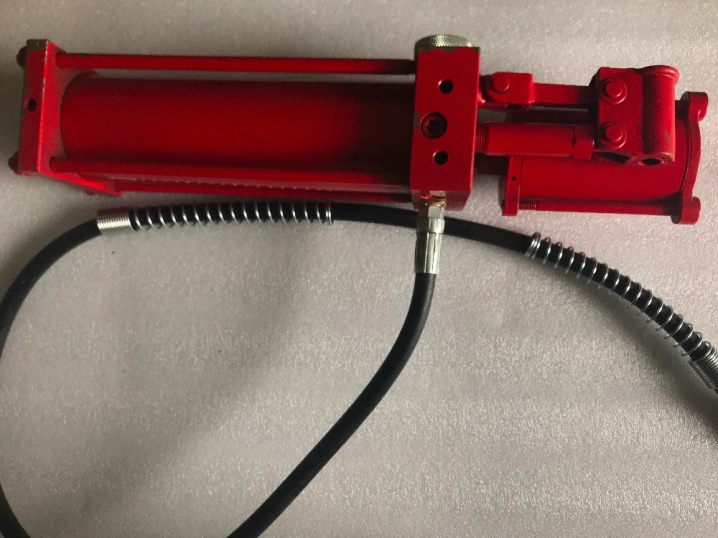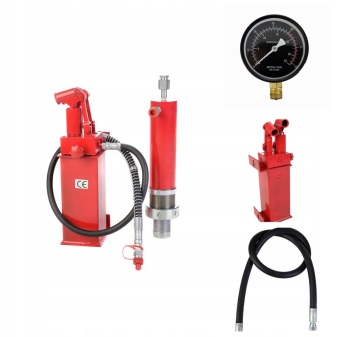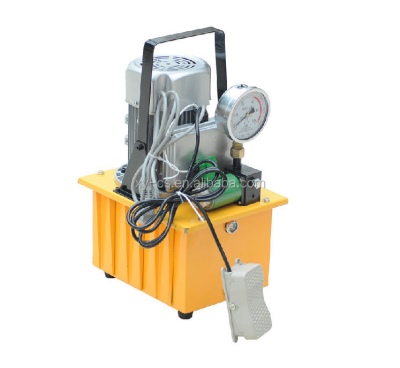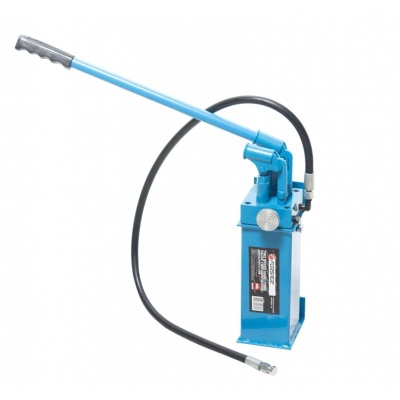Choosing a hydraulic pump for the press

A person who needs a hydraulic pump for a press, as a rule, is familiar with the characteristics of such equipment, the scope of application, the classification compiled by the main structural types. In practice, this is not always the case: despite the use of the ancient principle of mechanical displacement of liquid, modern pumps have a more complex design.

Features, device and principle of operation
The main purpose of the hydraulic system is the use of special equipment in the work. She is responsible for productivity in sectors of the national economy - from livestock and winemaking to construction and the provision of public services. The hydraulic pump is the basic element of the hydraulic system, it is responsible for the circulation of fluid (or its movement). The working fluid that moves between the cavities is a source of energy that allows the hydraulic drive to be driven.


A hydraulic press pump, like any device of this type, is a piece of equipment that converts mechanical energy into hydraulic energy (fluid energy). In this case, several types of sources of mechanical energy can be used:
-
drive electric motor;
-
movement of the piston, which is pressed;
-
manual lifting of the lever in a separate type design.


Conversion of energy into hydraulic from mechanical energy can also occur in different ways: under the action of pressure or pressure, movement of the working body (in the hydraulic cylinder, this can be a rod). Whatever the design of the device, its task is to move the liquid, displace the working medium from the inlet cavity to the outlet through special chambers. Moving along the pipeline, the working medium with the already existing high pressure (ensuring its movement), as a result, gives its energy to the piston, or continues to rotate in a closed loop.

The device and design features, as well as the source of mechanical energy, determine the scope and principle of energy communication - manual, mechanical or pneumatic.
The simplest, several hundred years old, is a piston liquid, based on the translational movement of a piston, which ensures the suction of liquid from a supply source.

Types and main characteristics
The piston liquid pump, according to some sources, was invented back in the days of Ancient Greece, but it is not known whether the valve mechanism, which provides a barrier to the liquid being pushed into the discharge line, dates back to that time. It must not enter the suction channel. Regardless of the type to which the functional device belongs, it has general characteristics - specific feed (working volume), maximum pressure and speed. The difference is in the type of displacing element.
-
Manual, powered by muscular effort (hence the name muscular in some sources), works from the translational movements of the lever (handle), which leads to the build-up of pressure, the movement of the piston in the instrument. One person is enough for tedious work.

- Radial piston it is used in lifts, presses and machine tools of a certain type, they are with an offset rotor and with its coaxial placement in relation to the stator.


- Axial piston resembles a radial piston in design, but these are small units, compact, with a variable design, which are not cheap, have significant power and speed.

- Gear belong to rotary hydraulic machines, they have their pros and cons. Liquid is captured by two gears with different types of engagement. These also include screw structures.

- Lamellar - suction from two areas and equipped with the same number of inlet zones.

The simplest in design, use and repair is manual, but there are other types to facilitate human labor and obtain muscular efforts. For example, foot, which is referred to as pneumohydraulic devices. It is a reliable high pressure source independent of external power supply. Electric, which does not require human effort, is not always within reach of electricity and rarely lends itself to self-repair.

The use of the foot does not require significant effort due to the two-stage oil supply, it is protected from exceeding the working pressure.
A water or pneumatically driven jack, like a hydraulic jack, can be designed for 10-20 tons, there are also more powerful ones, from 30 tons to 100 and more. The cost and scope depends on this indicator. The variety of offers from leading manufacturers can make it difficult for a layman to choose. There are online calculators for the calculations required upon purchase.

Selection Tips
Ratings of such equipment invariably begin with the mention of the current year, but advice on choosing the most functional subject of preference suggests that in some cases it is better to choose a press that has been tested by users for several years and is consistently accompanied by favorable reviews. First of all, you need to decide which will be more useful in a potential application: electrohydraulic, pneumohydraulic, tabletop, vertical, manual or foot, if we are talking about a device without an external power source.

Electro-hydraulic is useful in assembling, straightening, stamping, recycling, extrusion - working with metal. Therefore, it takes into account mobility, the presence of a winch, automatic return and stem finishing, a safety valve.
Tabletop, with a maximum of 15 tons, is placed on the tabletop, saving limited space. Wide range of applications, manual control, simple maintenance - these are undoubted advantages, apart from reliability and economy.

When buying a vertical press with a manual drive, take into account the scope of application, which is multifaceted - for pressing and forging, pressing oil, fruits or berries. For this, it is not only determined with the drive power, weight and installation method, automatic return and safety system.
In manual models, it is imperative to pay attention to the professionalism of the tool - the material of manufacture, ergonomics, the perfection of levers and accessories, multidirectional use, packaging, weight and a harmonious combination of price and quality.

Experts in this area focus on the fact that in the post-Soviet countries - in Russia and Belarus, excellent devices are produced that are not inferior in quality and power to foreign ones from the most famous manufacturers, while being even in retail are several times cheaper. Price is not the main thing in purchasing a press, you need to look at the warranty period, the strength of the materials used, ease of maintenance and reliability of the design.














The comment was sent successfully.